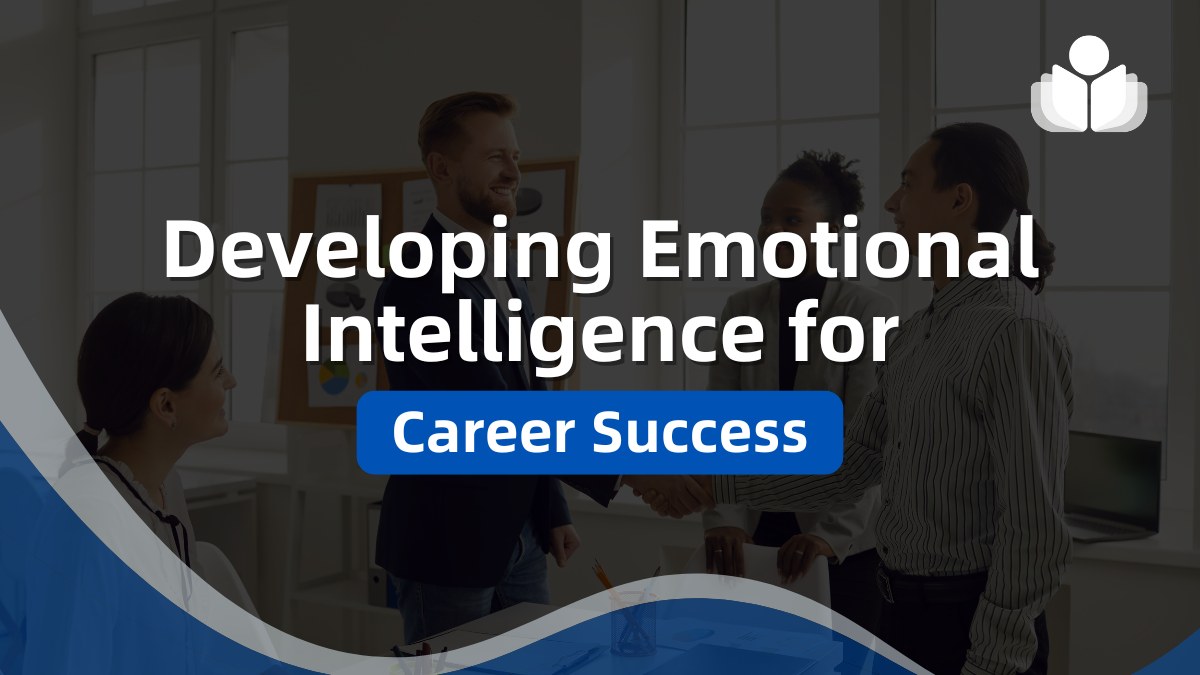Emotional Intelligence (EI) is the ability to recognize, understand, manage, and effectively use emotions in oneself and others. The core components of EI include self-awareness, self-regulation, motivation, empathy, and social skills, each contributing to how individuals interact and respond to emotional situations.
High EI enhances decision-making, promotes teamwork, and strengthens leadership, all of which are crucial for career growth. By managing emotions effectively, individuals can navigate challenges with resilience and form meaningful professional relationships. This guide provides actionable strategies to develop EI, focusing on achieving career success through enhanced emotional understanding.
Understanding the Components of Emotional Intelligence
Self-Awareness
Self-awareness involves recognizing and understanding one’s own emotions and their impact on thoughts and behavior. By identifying emotional triggers, strengths, and areas for growth, individuals can approach situations more thoughtfully. Self-awareness fosters personal growth and is essential for making informed career decisions and building authentic relationships.
Self-Regulation
Self-regulation is the ability to manage emotions, particularly in challenging situations. It includes staying calm under pressure and responding constructively. Techniques like deep breathing, mindfulness, and setting personal boundaries can help maintain professionalism and prevent reactive behavior, contributing to a steady, reliable presence in the workplace.
Motivation
Motivation refers to the internal drive to achieve goals with energy and persistence. People with high motivation focus on long-term success rather than immediate rewards. They exhibit a positive outlook, resilience, and a proactive approach to challenges. Strong motivation can improve performance, increase productivity, and foster a sense of purpose in the workplace.
Empathy
Empathy is the ability to understand and appreciate others’ emotions and perspectives. Practicing empathy builds trust and strengthens workplace relationships, enabling smoother collaboration and effective teamwork. By valuing diverse viewpoints, empathetic individuals create a supportive environment that promotes open communication and cooperation.
Social Skills
Social skills involve managing relationships, influencing others, and communicating effectively. People with strong social skills are adept at building networks, leading teams, and resolving conflicts. This proficiency in relationship management is vital for networking, collaboration, and leadership, contributing to a positive and productive workplace atmosphere.
Impact of Emotional Intelligence on Career Success
Emotional Intelligence (EI) strengthens relationships by fostering rapport and trust among colleagues and superiors. By understanding and managing one’s emotions, individuals are better equipped to empathize and communicate effectively, essential for building strong professional connections.
These relationships facilitate teamwork, collaboration, and mutual respect, creating a supportive work environment where ideas and solutions flourish.
Decision Making
EI allows professionals to make aim, balanced decisions by managing emotional responses and considering situations rationally. When emotions are well-regulated, individuals can think clearly, evaluate options effectively, and avoid impulsive choices.
This level of emotional control is critical in high-stakes scenarios, where staying calm and focused can lead to well-thought-out decisions that benefit both individual careers and organizational outcomes.
Increased Job Satisfaction and Engagement
High EI contributes to a positive attitude, resilience, and increased job satisfaction. Emotionally intelligent individuals handle setbacks constructively, stay engaged with their work, and adapt to change with minimal stress.
By navigating challenges with a positive mindset, individuals experience greater fulfillment in their roles, improving productivity and job commitment.
Leadership and Influence
Leaders with high EI inspire and motivate their teams by recognizing and addressing the emotional needs of others. Emotionally intelligent leaders foster a productive, inclusive environment by encouraging open communication, recognizing achievements, and providing support. This ability to connect on an emotional level makes them influential, respected leaders capable of guiding teams toward shared goals.
Developing Self-Awareness for Career Success
Practicing Mindfulness
Mindfulness techniques help individuals stay present and aware of their emotions and thoughts. Practices like deep breathing and focused observation allow for reflection on emotional responses, aiding in the identification of triggers and patterns.
This self-awareness is foundational for managing emotions and reacting constructively, especially in high-stress situations.
Journaling for Reflection
Keeping a journal helps individuals document their thoughts, emotions, and experiences. By regularly reflecting on these entries, individuals gain insights into their behaviors and patterns, which fosters self-awareness. Journaling is an effective tool for setting personal and professional goals, as it provides a space for honest self-assessment and continuous self-improvement.
Feedback from Colleagues and Mentors
Constructive feedback offers an external perspective on one’s behavior and impact on others. By asking for feedback from trusted colleagues or mentors, individuals can identify areas for improvement and enhance self-awareness. This feedback loop is invaluable for personal growth and helps individuals align their self-perception with how they are perceived in the workplace.
Personal Goals for Self-Improvement
Setting specific goals related to self-awareness, such as improving stress responses, allows individuals to focus on particular areas for growth. Regularly reviewing progress helps track development, reinforcing a commitment to self-improvement and providing measurable outcomes that support career advancement.
Building Self-Regulation Skills
Recognizing emotional triggers and stressors in the workplace is the first step in developing self-regulation. Pausing to reflect before responding allows individuals to choose their reactions deliberately, avoiding impulsive decisions and maintaining professionalism in challenging situations.
Practicing Patience and Tolerance
Remaining calm under pressure requires patience and tolerance. Practicing these skills helps individuals avoid impulsive actions and stay focused on long-term outcomes. This self-control promotes a composed demeanor essential for problem-solving and leading others effectively.
Developing Stress Reduction Techniques
Techniques like deep breathing, meditation, and time management are practical tools for managing stress. By practicing these techniques, individuals can maintain focus and productivity, which enhances their ability to handle workplace challenges with resilience.
Maintaining Accountability for Emotions and Actions
Taking responsibility for one’s emotions and their impact on others is a hallmark of self-regulation. By acknowledging the influence of their behavior, individuals build a reputation for professionalism and consistency, creating a positive and dependable presence in the workplace.
Motivation for Career Growth
Setting Clear Professional Goals
Establishing clear short-term and long-term career goals provides direction and a sense of purpose. By aligning personal values with career aspirations, individuals are more likely to stay motivated, as their efforts feel meaningful and connected to their desired outcomes. Regularly reviewing and adjusting goals keeps motivation strong and progress steady.
Growth Mindset
A growth mindset encourages embracing challenges and viewing setbacks as opportunities to learn. Individuals who focus on improvement rather than perfection develop resilience, essential for continuous growth and adaptability. This mindset makes it easier to stay motivated and engaged, even when obstacles arise.
Celebrating Small Wins and Progress
Recognizing and celebrating even minor achievements boosts morale and keeps motivation high. Regularly reflecting on progress, rather than focusing solely on long-term goals, helps maintain enthusiasm and a sense of accomplishment, fueling ongoing commitment to career development.
Finding Purpose and Meaning in Work
Identifying aspects of one’s job that provide personal satisfaction and fulfillment adds intrinsic motivation. A sense of purpose deepens engagement as individuals see the value in their work beyond immediate tasks, creating a sustained drive to excel and contribute meaningfully.
Empathy in the Workplace
Active Listening Techniques
Active listening involves giving full attention to others, avoiding interruptions, and showing understanding. Practicing active listening helps colleagues feel valued and respected, building rapport and trust. This approach strengthens connections and fosters a supportive work environment.
Reading Nonverbal Cues
Observing body language, facial expressions, and tone of voice enhances comprehension and empathy. Nonverbal cues often reveal underlying emotions, allowing individuals to respond thoughtfully, improving communication and relationships.
Putting Yourself in Others’ Shoes
Perspective-taking involves imagining oneself in a colleague’s position to understand their experiences and viewpoints. This empathetic approach strengthens relationships, aids in conflict resolution, and promotes a culture of inclusivity and collaboration.
Offering Support and Encouragement
Providing emotional support during challenges creates a positive and resilient workplace culture. Encouragement and understanding from peers enhance morale and foster a community where colleagues support each other’s growth and well-being.
Developing Strong Social Skills for Career Success
Communication Skills
Clear and impactful communication is crucial for conveying ideas and building relationships. Tailoring communication styles to suit different audiences and contexts enhances understanding and influence, supporting professional interactions at all levels.
Professional Relationships and Networks
Networking within and outside the organization broadens career opportunities and provides access to diverse insights and resources. Strong professional connections open doors to career advancement and foster a support network.
Resolution and Diplomacy
Constructive conflict resolution skills help manage disagreements in a way that preserves relationships. Applying emotional intelligence, finding win-win solutions, and addressing issues diplomatically create a harmonious and cooperative work environment.
Collaboration and Teamwork
Collaboration involves sharing credit, supporting team members, and working toward collective goals. Strong teamwork skills contribute to a positive work environment and individual success, as collaborative efforts often lead to better outcomes and mutual growth.
Assessing and Tracking Emotional Intelligence Development
Emotional Intelligence (EI) assessments, like the EQ-i or self-assessment quizzes, provide valuable insights into one’s EI levels. These tools help individuals identify strengths and pinpoint areas for improvement, serving as a foundation for targeted EI development.
Regular self-assessment allows individuals to monitor their progress and focus on personal growth.
Setting Milestones for EI Growth
Defining specific milestones helps track progress in EI development. Examples might include increasing patience during challenging situations, enhancing listening skills, or becoming more open to feedback. Milestones create clear objectives that make it easier to measure improvements and motivate continuous EI development.
Feedback from Peers and Supervisors
Feedback from colleagues and supervisors is invaluable for assessing EI progress. Constructive feedback offers external perspectives, highlighting areas that might not be visible through self-assessment alone. Regularly seeking feedback fosters a growth mindset and encourages meaningful improvements in emotional intelligence.
Adjusting Strategies Based on Self-Reflection
Regular self-reflection enables individuals to adjust their EI development strategies as needed. Revisiting goals and adapting techniques helps maintain a commitment to lifelong EI growth, ensuring the journey remains relevant and responsive to new challenges and experiences.
Emotional Intelligence in Leadership and Management
Emotionally intelligent leaders create supportive, inclusive environments where team members feel valued. Empathy in leadership enhances team morale, promotes loyalty, and encourages open communication, all of which contribute to a productive workplace.
Inspiring and Motivating Teams
Emotionally intelligent leaders recognize team strengths, set clear goals, and celebrate achievements. Acknowledging individual contributions fosters engagement and motivation, driving productivity and aligning with organizational objectives.
Building Trust and Open Communication
Transparency and honesty are foundational to building trust with team members. Leaders who communicate openly create a culture of trust, making it easier for team members to share feedback and ideas. EI in leadership nurtures a supportive atmosphere where employees feel secure in expressing themselves.
Managing Stress and Setting an Example
Emotionally intelligent leaders model resilience by managing stress effectively, which inspires their teams to do the same. By demonstrating EI behaviors such as self-regulation and patience, leaders cultivate a calm, focused workplace culture that encourages others to adopt similar qualities.
Conclusion
Emotional Intelligence (EI), comprising self-awareness, self-regulation, motivation, empathy, and social skills, is essential for career advancement. It supports effective leadership, enhances collaboration, and fosters personal and professional growth.
Prioritizing EI development is critical to long-term career success. Embracing EI as an ongoing journey provides countless benefits, from improved relationships and decision-making to greater resilience. Developing EI strengthens one’s career and enriches personal life, leading to a more fulfilling and balanced future.
 Sections of this topic
Sections of this topic
















